| Srl | Item |
| 1 |
ID:
059606
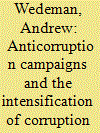

|
|
|
| 2 |
ID:
096832
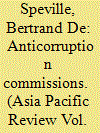

|
|
|
| 3 |
ID:
153318
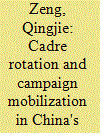

|
|
|
|
|
| Summary/Abstract |
In authoritarian regimes, anticorruption measures are fundamentally mechanisms of controlling agents at various levels. To do this, the principal can either rely on routine bureaucratic management or resort to ad hoc, intense mobilization to discipline its agents. Using China as a case study, this article explores which mode of top-down control exerts greater influence on the pattern of anticorruption enforcement. We focus on the cadre rotation system as an example of routine management techniques and examine its effects on provincial level enforcement. We also investigate how provinces respond to the central government's periodic call to intensify anticorruption efforts. Based on provincial enforcement data from 1998 to 2013, our analysis finds that the proportion of rotated officials has little impact on enforcement outcomes. Rather, the vigor of enforcement in the provinces responds strongly to national policy priorities, suggesting a highly centralized disciplinary system. Moreover, provinces of greater political importance are under more central pressure to conform. The findings challenge the often-made argument that stable institutions are effective in fostering top-down control in authoritarian regimes, and suggest that campaign mobilization continues to be an essential instrument at the dictator's disposal.
|
|
|
|
|
|
|
|
|
|
|
|
|
|
|
|
| 4 |
ID:
143773
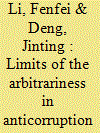

|
|
|
|
|
| Summary/Abstract |
Based on interviews in local commissions of China’s Party discipline inspection (CDIs), this article investigates the effectiveness, internal limits and selectiveness of CDIs in the anticorruption campaign. It uses a micro-level analysis to explore the role of law in affecting the CDIs’ anticorruption work and concludes that local CDIs remain heavily affected by the same-level local governments, but are effective in combating local corruption due to recent reforms that have strengthened higher-level CDIs’ control over lower-level CDIs. The current internal decision-making systems of the CDIs make their anticorruption work heavily dependent upon the central leadership. Their work is still not institutionalized and relies heavily on higher-level intervention. Nevertheless, law played a crucial role by providing the bottom lines to set the decision-making standards at different stages. Legal reforms should aim to further clarify and lift these baseline standards.
|
|
|
|
|
|
|
|
|
|
|
|
|
|
|
|
| 5 |
ID:
163412
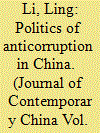

|
|
|
|
|
| Summary/Abstract |
This article traces the process of Xi Jinping’s campaign in 2012–2017 and explains how an anticorruption effort has been transformed into an exercise of power-consolidation for his office. The findings of this article are three-fold. First, the power-consolidation process has benefited from a combination of an ideological campaign and a disciplinary campaign, which were not only synchronized but also feed into one another to achieve a shared goal. Second, the campaign became politicized around midterm and intensified afterwards. The pace of progress of the campaign coincided with Xi Jinping’s advancement of power. Third, the most significant outcome of Xi Jinping’s campaign is not the numbers of disciplined corrupt officials but the paradigm-change in the disciplinary regime of the Party: first, the reversal of the depoliticization process of the Party’s disciplinary regime; second, the retention of temporarily mobilized anticorruption resources; and third the simplification of evidence production procedure. The combined result is a considerable expansion of the CCDI’s anticorruption investigative capacities and a significant increase Xi Jinping’s leverage to impose political loyalty and compliance upon Party officials in the future.
|
|
|
|
|
|
|
|
|
|
|
|
|
|
|
|
| 6 |
ID:
190035
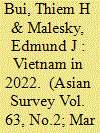

|
|
|
|
|
| Summary/Abstract |
Vietnam in 2022 was beset with numerous dramatic political developments and diplomatic uncertainties but also recorded significant economic achievements. Changes in the top echelons of power took place in an unprecedented manner due to the intensifying anticorruption campaign, exposing the malleability of elite Vietnamese governing institutions and shrinking the space for civil society organizations. Meanwhile, Vietnam was recognized for its outstanding recovery from the COVID-19 pandemic with remarkable economic performance. The country’s “bamboo diplomacy” was put under stress amid challenges caused by Russia’s invasion of Ukraine and the US–China strategic rivalry. Navigating the turbulence and uncertainty of domestic and international affairs while maintaining the momentum of economic recovery will be the main challenge for Vietnam in 2023.
|
|
|
|
|
|
|
|
|
|
|
|
|
|
|
|